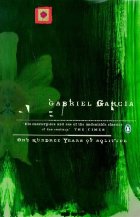Review: ‘One Hundred Years of Solitude’ by Gabriel Garcia Marquez

 Title: One Hundred Years of Solitude
Title: One Hundred Years of Solitude
Author: Gabriel Garcia Marquez, trans. Gregory Rabassa
Published: Penguin, 1998, pp. 422. Originally published 1967
Genre: Latin American fiction
Blurb: One Hundred Years of Solitude tells the magical story of the Buendia family, who love, lie, fight and rule for a century in Macondo, their settlement in the South American jungle. Part exotic paradise, part nightmare, Macondo is a fantastic world of miracles and mirages where nothing is as it seems. Its secrets lie hidden for years in an encoded book, and only Aureliano Buendia, the last in the dynasty, can unlock its mysteries and discover the fate of this strange land…
When, where and why: This is yet another book from my charity shop university days when it would seem my eyes were considerably bigger than my reading stomach (plus ca change and all that). I’ve had it kicking around on the shelves for ages now, so it definitely qualifies for book 28/50 for my Books Off the Shelf Challenge, and finally decided to read it to continue to explore areas of literature which are new to me.
What I thought: When a book is as well known and as widely read as One Hundred Years of Solitude it’s hard to approach it without certain expectations. In this case, I was anticipating a magical and mysterious story written in beautiful, evocative prose and while I eventually came to enjoy the book it never quite lived up to these expectations. It’s entirely possible that this was my fault for wanting something out of the book that it just wasn’t, but I found it slow, confusing and, although it had its moments, described in fairly sparse, mundane terms.
The book started out promisingly: I enjoyed the fairytale style of the narrative, as the father trades increasingly large amounts of money and produce with the visiting gypsies for increasingly bizarre and useless items. Had the book continued in this vein I would probably have enjoyed it far more than I did, but as I read on I realised that I was getting further and further into the book without any idea of where it was going, or if it was going to go anywhere at all. I found myself getting frustrated with the book as things happened but nothing ever seemed to change: characters would marry and die, wars would take place, time moved on but everything remained the same. Part of me thinks that this sense of constancy as things change around the Buendia family and they remain unaffected was what Marquez was aiming for (the novel is, after all, called One Hundred Years of Solitude) and that I didn’t get it, but nonetheless I found this made the first two thirds of the novel feel stagnant and it wasn’t something I enjoyed.
Part of the problem is that nearly every male character in the novel is called either Jose Arcadio or Aureliano (or possibly, just for a bit of exciting variety, some variation thereon), making it very difficult to tell them all apart. At one point, the author refers to ‘several of the Aurelianos’ (p. 222), and if even he can’t keep them all straight there’s no hope for the reader. This issue was compounded by the fact that none of them had any distinctive characteristics and so, because they all blurred together, it was hard to get to know any of them. Again, this may have been a deliberate choice on the part of the writer to make the Buendia family feel separated from everyone else including the reader, in which case it was very effective, but that doesn’t mean that I enjoyed the effect. This was combined with the vast majority of events being reported to the reader rather than experienced directly, resulting in everything feeling a bit vague. Being told about apparently insignificant events which happen to characters you neither know nor care for does not an engaging read make.
I don’t know whether it was because the writing improved, or I finally got into the peculiar rhythm of the book, or I just gave up and stopped caring that it was so odd, but I found the final third of the book to be much better than all that had come before and I think this was because the episodes of this section felt more complete and also centred around the female characters, who are much more distinct that the men. I really enjoyed reading about Remedios the Beauty and her sudden flight, Ursula and her clever ways of coping with growing old and losing her sight, Amaranta’s deal with death as she sews her own shroud, and Meme and her love affair accompanied by yellow butterflies. Of course, it was still decidedly odd but, like the initial few pages, it was an oddness with a fairytale logic to it that somehow made sense. However, this section of the book also yielded the biggest eyebrow-raise and snort of laughter in the whole novel, courtesy of this sentence:
…she would play with Aureliano’s portentous creature as if it were a doll and would paint clown’s eyes on it with her lipstick and give it a Turk’s moustace with her eyebrow pencil, and would put on organzi bowties and little tinfoil hats. (p. 411)
Need I say more? I’m sorry, I just had to share that piece of awfulness.
In spite of the writing generally not living up to my expectations, there were moments when it was beautiful and insightful. I thought the tongue-in-cheek explanation of the difference between Conservatives and Liberals was very well done, but possibly my favourite passage describes Pilar Ternera:
Pilar Ternera had lost the trail of all hope. Her laugh had taken on the tones of an organ, her breasts had succumbed to the tedium of endless caressing, her stomach and her thighs had been the victims of her irrevocable fate as a shared woman, but her heart grew old without bitterness. (p. 156)
On the whole though, this book didn’t work for me. I enjoyed parts of the end section, but found the greater part of One Hundred Years of Solitude unappealingly vague. It is considered by many to be a great work of literature though, so I’m perfectly willing to accept that the fault is probably with me rather than the book.
Where this book goes: This book is staying put for now. I have Love in the Time of Cholera by Marquez on my bookshelf and I think I’ll give that one a try in the new year to give him a second chance. If that one is equally disappointing though, both will be off to BookMooch.
Tea talk: As I was reading a Latin American book I thought that now would be the time to try some Latin American tea, so out came the Bolivian Chaimate Esmeraldo from Char in Winchester. I’ve loved all of their teas that I’ve tried so far, so I suppose it was only a matter of time before one came along that broke that trend and this was it. I thought it tasted oddly like the fried crispy seaweed you get in Chinese restaurants, and while I enjoy that taste with fried rice and shredded duck I am less fond of it in a cup of tea.
2 Responses to “Review: ‘One Hundred Years of Solitude’ by Gabriel Garcia Marquez”
Comment from oldenglishrose
Time November 24, 2010 at 11:34 pm
Strangely enough, the magic didn’t bother me half so much as the lack of anything happening; in fact, I actually rather enjoyed it. I think perhaps because I read a fair bit of fantasy I’m primed to accept odd goings on without too much of a mental leap, even when they are as odd as in this book. I’m glad to know I’m not the only one who found it a slog though.
Comment from Laura
Time November 24, 2010 at 10:52 pm
Great review, I’m glad you got into it in the end. I’m not a fan of magical realism, and I really struggled with this book!